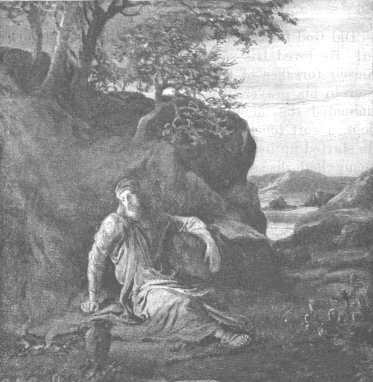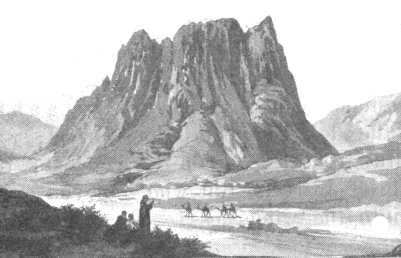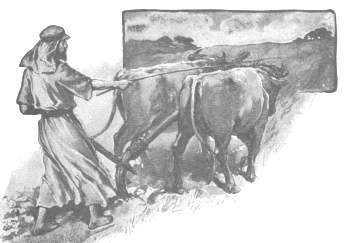Elijah flees from Jezebel 1
An angel finds him under a tree 4
He goes to a cave 9
The spirit speaks in the still, small voice; 7000 are faithful 11
Elisha follows Elijah 19
Elijah and our commitment note
.
|
|
|
| .1
¶ And Ahab told Jezebel all that Elijah had done, and withal how he
had slain all the prophets with the sword.
2 Then Jezebel sent a messenger unto Elijah, saying, So let the gods do to me, and more also, if I make not thy life as the life of one of them by to morrow about this time. 3 And when he saw that, he arose, and went for his life, and came to Beersheba, which belongeth to Judah, and left his servant there. |
2 - Jezebel ... thy life The direct hand of God did not cause her to sense the importance of following the true God. She pledged her life and to be killed in a worse way than her prophets if she couldn't kill Elijah. She got the consequences of her vow 2ki0930. |
 .4
But he himself went a day's journey into the wilderness, and came and sat
down under a juniper tree: and he requested for himself that he might die;
and said, It is enough; now, O LORD, take away my life; for I am not better
than my fathers. .4
But he himself went a day's journey into the wilderness, and came and sat
down under a juniper tree: and he requested for himself that he might die;
and said, It is enough; now, O LORD, take away my life; for I am not better
than my fathers.
.5 And as he lay and slept under a juniper tree, behold, then an angel touched him, and said unto him, Arise and eat. 6 And he looked, and, behold, there was a cake baken on the coals, and a cruse of water at his head. And he did eat and drink, and laid him down again. 7 And the angel of the LORD came again the second time, and touched him, and said, Arise and eat; because the journey is too great for thee. A story with good lessons for us. Satan can make us feel discouraged in spite of evidence that God is our strength. When discouraged, we need to exercise faith, pray, and work. See 2co1209. 6 - Cake baken on the coals This reminds us of Jesus' appearance to the discouraged disciples jn21. The Lord cares for His children. |
|
| 8 And he
arose, and did eat and drink, and went in the strength of that meat forty
days and forty nights unto Horeb the mount of God.
.9 ¶ And he came thither unto a cave, and lodged there; and, behold, the word of the LORD came to him, and he said unto him, What doest thou here, Elijah?  .10
And he said, I have been very jealous for the LORD God of hosts: for the
children of Israel have forsaken thy covenant, thrown down thine altars,
and slain thy prophets with the sword; and I, even I only, am left; and
they seek my life, to take it away. .10
And he said, I have been very jealous for the LORD God of hosts: for the
children of Israel have forsaken thy covenant, thrown down thine altars,
and slain thy prophets with the sword; and I, even I only, am left; and
they seek my life, to take it away.
8 - Unto Horeb This is another name for Sinai. Elijah was to cover the ground traveled by the wandering children of Israel. 9 - Cave Moses had spent time on the same mountain ex3322. 9 - What doest thou here? A good question. Why wasn't he providing stability to the people of Israel who had made a new commitment to the true God? Elijah, in the cave was ready to seek God and to listen. 10 - Jealous ... they seek my life We must look beyond our daily trials realizing that we are in the land of the enemy and faithfulness unto death is a sure sign of the crown of life re0210. We may follow the leading of the Lord without regard for the consequences. This was the attitude of John the Baptist who was beheaded. We must consider what is more important, our convenience and safety or God's mission. This is not to say that we should disregard obvious precautions and even leave when we see it is best, the effectiveness of our work being cut off mt1023. Of course we pray for wisdom. |
|
| .11
And he said, Go forth, and stand upon the mount before the LORD. And, behold,
the LORD passed by, and a great and strong wind rent the mountains, and
brake in pieces the rocks before the LORD; but the LORD was not in the
wind: and after the wind an earthquake; but the LORD was not in the earthquake:
.12 And after the earthquake a fire; but the LORD was not in the fire: and after the fire a still small voice. |
10
- The Lord passed by This helped give
the prophet perspective. Compare the experience of Moses ex3405.
12 - Still [quiet] small voice "Gentle whisper" NIV. jn1420. |
| 13 And it was so, when
Elijah heard it, that he wrapped his face in his mantle, and went out,
and stood in the entering in of the cave. And, behold, there came a voice
unto him, and said, What doest thou here, Elijah?
14 And he said, I have been very jealous for the LORD God of hosts: because the children of Israel have forsaken thy covenant, thrown down thine altars, and slain thy prophets with the sword; and I, even I only, am left; and they seek my life, to take it away. |
13
- Heard ... wrapped his face This was
Elijah's encounter with God.
13 - What doest thou here? The same question as in v9. And in v14 he gives the same answer but with a new attitude. He was concerned for the honor of God, not his own reputation or safety as before. |
| 15 And the LORD said
unto him, Go, return on thy way to the wilderness of Damascus: and when
thou comest, anoint Hazael to be king over Syria:
.16 And Jehu the son of Nimshi shalt thou anoint to be king over Israel: and Elisha the son of Shaphat of Abelmeholah shalt thou anoint to be prophet in thy room. .17 And it shall come to pass, that him that escapeth the sword of Hazael shall Jehu slay: and him that escapeth from the sword of Jehu shall Elisha slay. .18 Yet I have left me seven thousand in Israel, all the knees which have not bowed unto Baal, and every mouth which hath not kissed him. |
15
- Return He was not where God wanted him to be. He was yet
to serve.
16 - Anoint The first two to be anointed were not righteous people but they, with Elisha, would play a part in the fulfillment of God's purpose. God would use them and Elijah's actions would apparently help people understand that God was in charge of events. 17 - Elijah slay There is no record of his killing anyone. Consider the following texts: jn1836, ho0605, je0110, he0412, 2co1003. 18 - I have ... seven thousand Response to Elijah's discouraging viewpoint beginning at v14. |
19
¶ So he departed thence, and found Elisha the son of Shaphat, who
was plowing with twelve yoke of oxen before him, and he with the twelfth:
and Elijah passed by him, and cast his mantle upon him.
20 And he left the oxen, and ran after Elijah, and said, Let me, I pray thee, kiss my father and my mother, and then I will follow thee. And he said unto him, Go back again: for what have I done to thee? .21 And he returned back from him, and took a yoke of oxen, and slew them, and boiled their flesh with the instruments of the oxen, and gave unto the people, and they did eat. Then he arose, and went after Elijah, and ministered unto him. 19 - Elisha ... plowing Notice that Elisha himself was using only one team. He had servants working with him. More important is that God called him from being a farmer. The prophet John the Baptist had a mantle or robe of camel's hair – probably not the most comfortable mr0106. Prophets are not dependent on human wisdom because they are instructed by God. Their independent source of clothing may reflect this. However, prophets do respond to information they get from human sources giving inspired counsel. Paul's ministry is an example. 20 - Kiss my father In saying, "Go back again," Elijah was testing Elisha. At that point what was more important, love for parents or love for the work of God? Even activities, good in themselves, may be idols preventing our full commitment to God. We may assume Elisha later had occasion to kiss his parents. 21 - Slew ... boiled ... with the instruments He took the used the wooden parts of the plow assembly to cook the meat. He would never turn back to farming. Image
from 1906
|
|
|
|
|
|
|
|
The following is
taken from the book that provided images for the story of Elijah.
"Through the long centuries that have passed since Elijah's time, the record
of his lifework has brought inspiration and courage to those who have been
called to stand for the right in the midst of apostasy. And for us, "upon
whom the ends of the world are come" (1 Corinthians 10:11), it has special
significance. History is being repeated. The world today has its Ahabs
and its Jezebels. The present age is one of idolatry, as verily as was
that in which Elijah lived. No outward shrine may be visible; there may
be no image for the eye to rest upon; yet thousands are following after
the gods of this world — after riches, fame, pleasure, and the pleasing
fables that permit man to follow the inclinations of the unregenerate heart.
Multitude have a wrong conception of God and His attributes, and are as
truly serving a false god as were the worshipers of Baal. Many even of
those who claim to be Christians have allied themselves with influences
that are unalterably opposed to God and His truth. Thus they are led to
turn away from the divine and to exalt the human.
"The prevailing spirit of our time is one of infidelity and apostasy —
a spirit of avowed illumination because of a knowledge of truth, but in
reality of the blindest presumption. Human theories are exalted and placed
where God and His law should be. Satan tempts men and women to disobey,
with the promise that in disobedience they will find liberty and freedom
that will make them as gods. There is seen a spirit of opposition to the
plain word of God, of idolatrous exaltation of human wisdom above divine
revelation. Men have allowed their minds to become so darkened and confused
by conformity to worldly customs and influences that they seem to have
lost all power to discriminate between light and darkness, truth and error.
So far have they departed from the right way that they hold the opinions
of a few philosophers, so-called, to be more trustworthy than the truths
of the Bible. The entreaties and promises of God's word, its threatenings
against disobedience and idolatry — these seem powerless to melt their
hearts. A faith such as actuated Paul, Peter, and John they regard as old-fashioned,
mystical, and unworthy of the intelligence of modern thinkers." – Ellen
White, Prophets and Kings, 1917, pp. 117, 118.